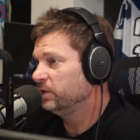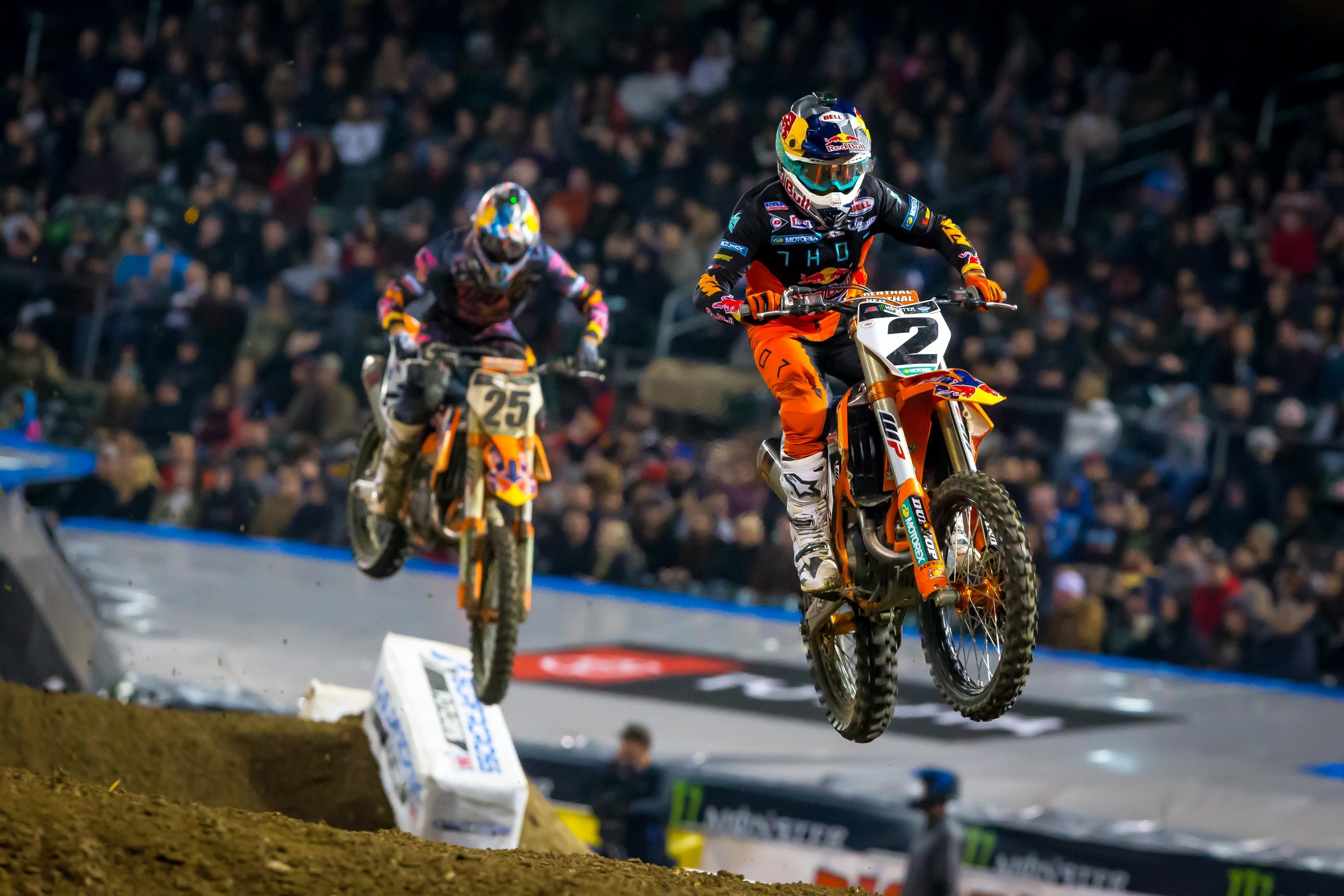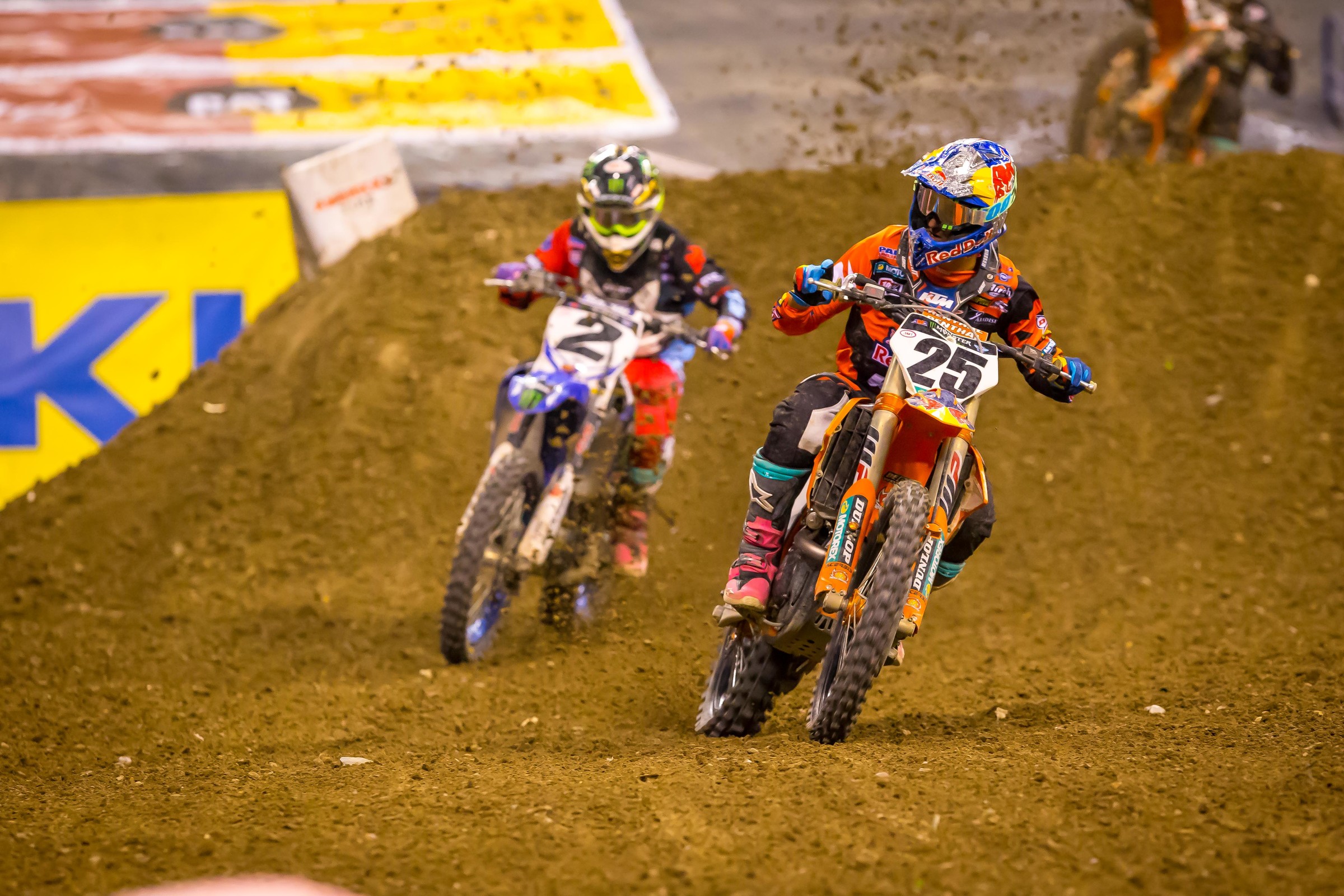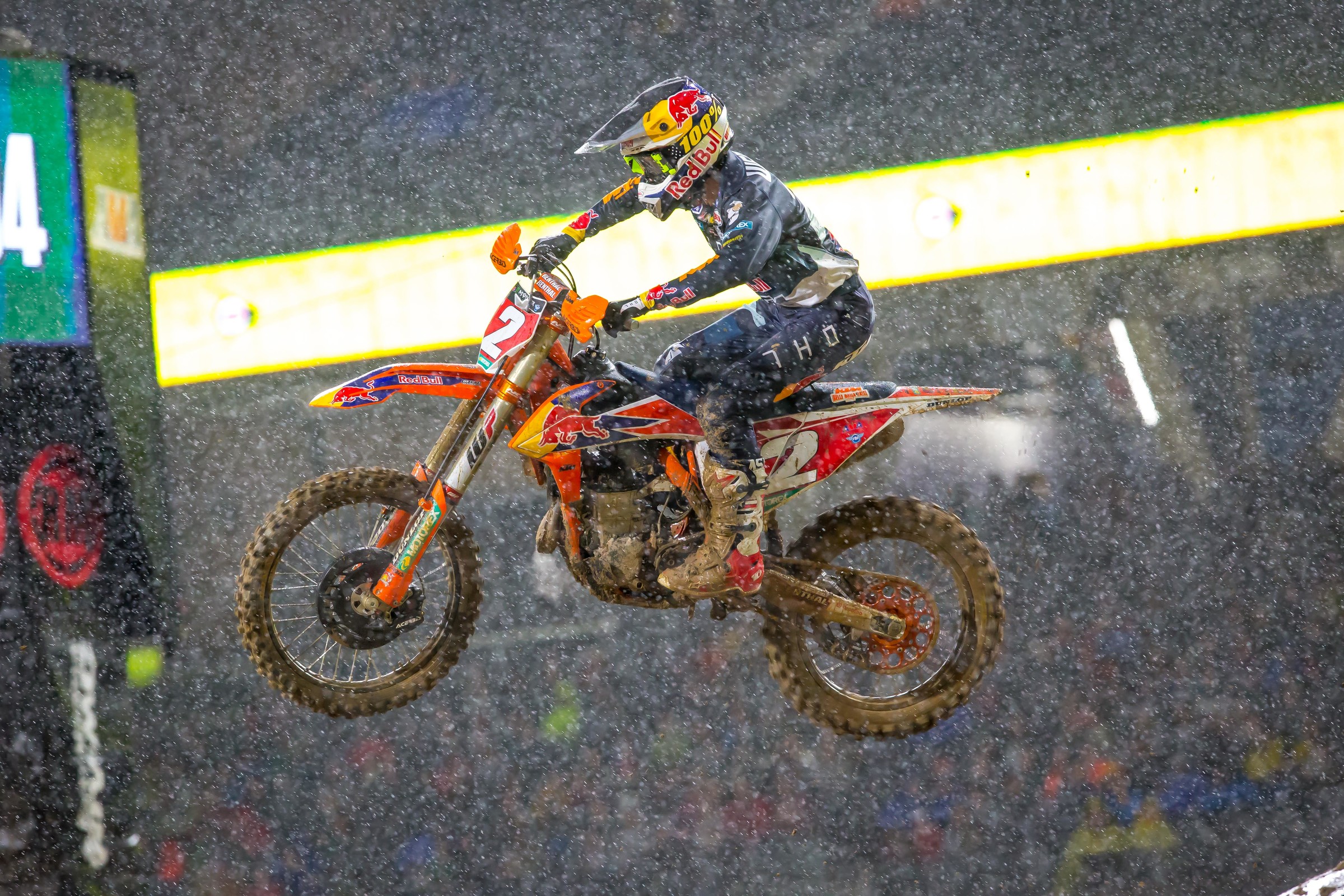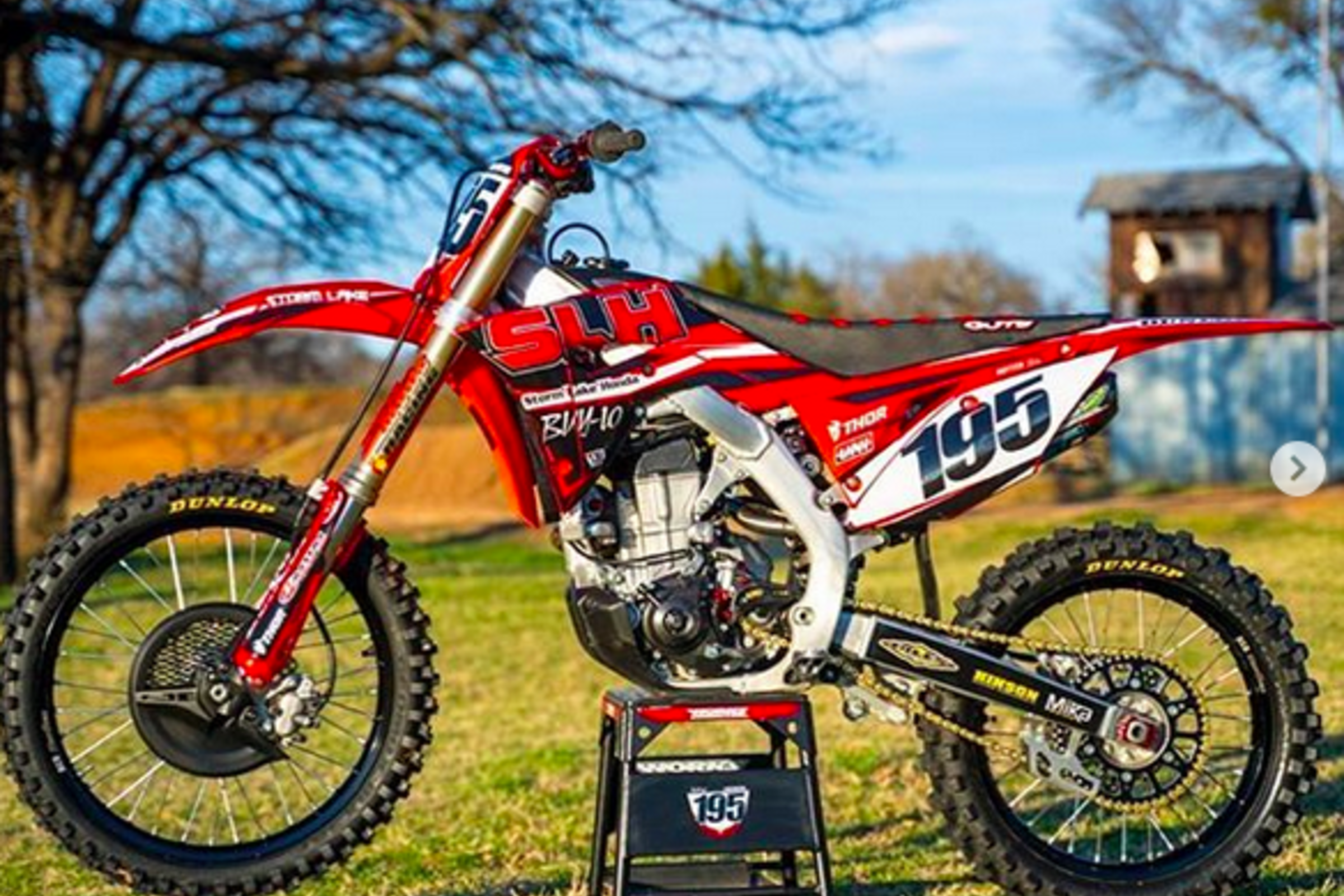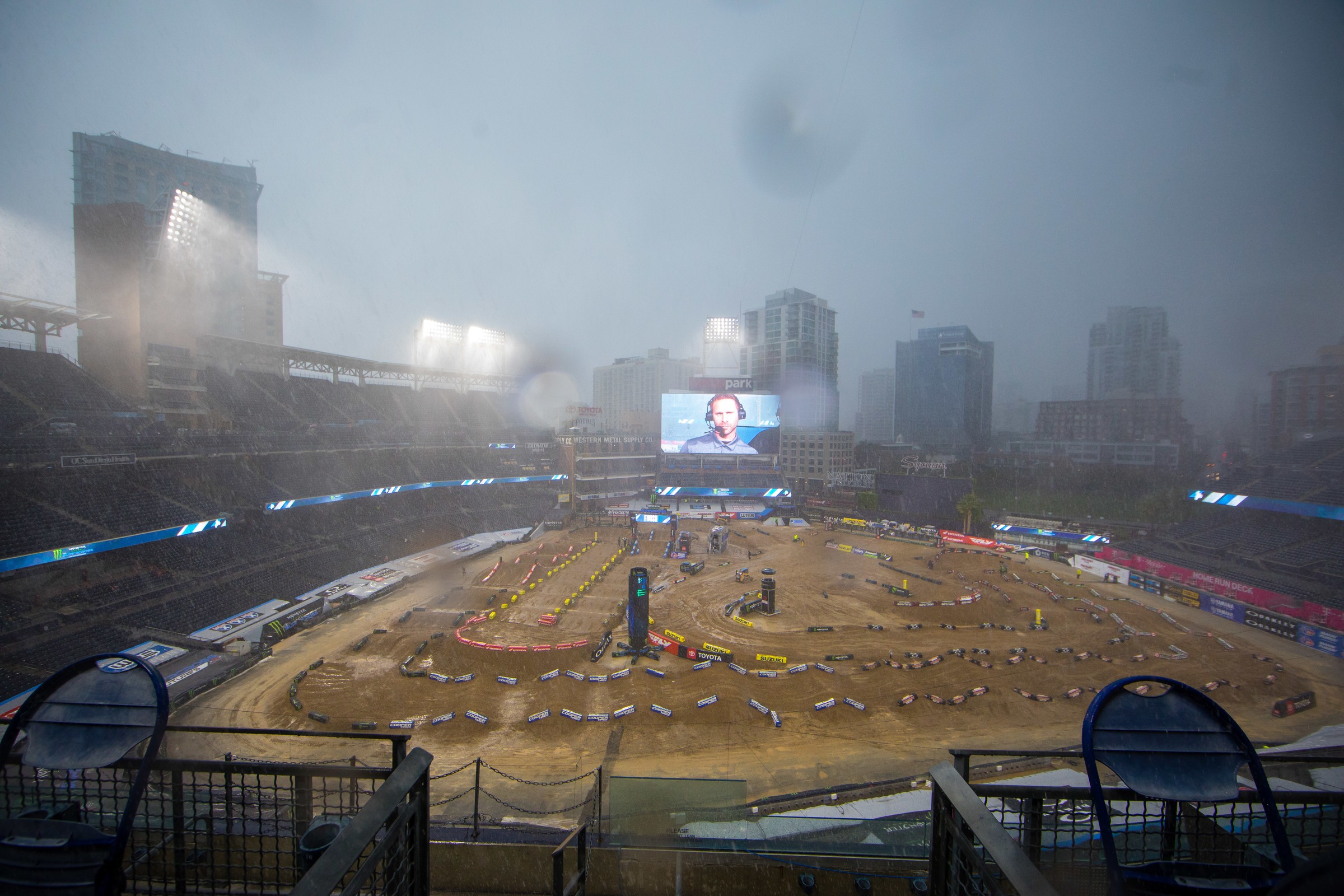Trainer Aldon Baker is working his magic once again, this time with Red Bull KTM’s Cooper Webb. In his first year in Baker's program, Coop notched two consecutive wins (the first two of his 450 career) and rocked the red plates at San Diego this past weekend. On the Fly Racing Racer X Podcast, I talked to Baker about each of his guys and their seasons so far.
Here’s an excerpt of the podcast and the whole thing can be found here.
On Cooper Webb…
I appreciate the kind words, but he’s doing it. He’s putting it into play. Yes, I think obviously the guidance and the help from everyone is huge and it’s good for him, but the good thing with Coop is he’s applying it, which is fantastic. He did come in—and I’ve always said this from the beginning. He had to jump into the big pond. I think for him to make such big changes, is not easy. He could have in a way kind of settled, and yet he didn’t. He decided, “I’m going to do this and I’m going to be all-in.” The good thing too is he came in knowing that, “I’ve got a lot to learn and I’ve got to apply myself to these changes, and I’ve got to be willing to do it under different people’s terms.” That was all explained up front. He’s stuck to that and it’s been good.
To be honest, it was a tough off-season for him with all the changes and all the scenarios and the volume and stuff that we all feel is needed to be done. He hung in there and then bit a bullet, if I can say, and has got through [it]. It’s great to see that the results are coming for him, which he deserves. I think anyone in this sport understands that it does take a lot of hard work and a lot of dedication and commitment. From our side one of the biggest things is that discipline part where you don’t let any part of it slack off. It’s been good.
Are you surprised though right now with the back-to-back wins and Coop getting the red plates for the first time in his 450 career at San Diego?
No, I’m not surprised. I am a little impressed that it came pretty early, because one of the biggest keys in maintaining and winning is that confidence that comes through once your preparation and everything comes together. That’s been building. The other thing to him, one of the toughest areas for him—and I was so impressed in that second race in that [Anaheim 2 Triple Crown] three-race format where he got the start but was able to maintain his speed. That for me is a tough deal and has been in the past for him. So that was something we worked in the off-season because he does have obviously ability and talent and he does have speed. It was that maintaining a consistency and focus through the whole period of a race sort of simulation. I was really impressed.
I knew once he could do that, then that was a big, big step for him. Which then this last weekend [in Oakland] he was able to maintain it. It got a little close at the end, but still he was able to not make many mistakes and maintain in an area that in the past I feel has been really pretty tough for him. Just shows you he’s applying himself to areas that he’s probably not been the strongest in the past, and it’s coming together. So really, really proud of the way he’s pulled that together and applied himself.
He’s told us on the PulpMX Show about that the intensity when he got to the program—he said he was three seconds off a lap sometimes! You had told me at Anaheim 1—we had talked during track walk, and you told me it started rough. You didn’t elaborate, but you said there was some head-butting. So I imagine it was those days where you were like “Hey,” and as we mentioned in the interview, “We don’t do 75 percent here.”
Yeah. There’s a level of expectancy. I always say that every lap should count. That’s a hazard on its own. The amount of practicing that we need to do and the amount of racing. As we know, you don’t take that lightly. So that type of intensity, and to create that, is not as simple as people say. It’s one thing saying, “You need to go out there and ride harder.” Well, everyone’s trying. I think getting an understanding of the different degree of that is tough until you kind of almost see it slap you in the face. Then it’s the case of does the guy hang in with us and believe? And it’s going to come around if he applies himself? Or is he like, this is one step that’s maybe too much?
Obviously, you have a deal with KTM and Husqvarna to take in their riders, but Trey Canard didn’t work with you [when he rode for KTM]. Dean Wilson hasn’t worked with you in the past [when he rode for KTM]. They signed Webb this year. Who's idea was it to bring him into your program? Does Roger [DeCoster] come to you and say, “We want Webb to go to you?” Does Webb come to you? Do you say, “Hey, we’ll take Webb in?” I know you’re big on group dynamics and personalities meshing. Webb had some enemies with your guys over the years. Do you say, “No way. I’m not taking this kid. Marv’s going to freak out.” How does that come together?
That’s a good question. I think it really starts with firstly for me, I’m only really comfortable at doing four guys. In a perfect world, three 450 guys is normally my deal, and then always an up-and-coming 250 guy that’s almost close to making the jump. But there again, there’s different dynamics and the times change. It also depends on what type of opening do I have? Obviously with Ryan moving on and retiring, it opened up a spot. Then we know that Zach’s going to move up a spot. So there’s a lot of dynamics that from my end—you’re right—I’m trying to get a balance where I can get each guy to get the best out of each person, but then also not completely upset the whole program. That is a fine line to run it.
But it does also start with KTM and obviously Roger. When they’re looking for a new rider your choice is of who’s up. Everyone knows that. So out of the choices that are available, they do start analyzing. This is who we have available to us. Now how can we get the best out of them, and then that’s where it starts. Then they approach me and say, “Hey, this is who we’re looking at. What are your thoughts? This is what we would like to see.” Then I try and figure out, okay, that’s going to be a challenge, or what are the dynamics? So it is great. It’s a great team. We all do put our heads together and try and figure out how do we get the best results with the choices that we have?
Also giving each guy the best possible environment and area to get the best out of them. It has to work all throughout. So with Coop coming on board, it is something I think the rest of the guys were not like, “That’s so awesome, and we can’t wait.” They knew he’s a guy that has ability, and put in the right environment could also be a threat to them. But in the bigger picture, they also see that no matter what, we’re going to race the guy on the weekend anyway. If he wasn’t on our team, or if he was. I think there can be a bit of a better balance too with how we get each guy to get the best out of him. Then really it’s left up to the race craft on the weekend.
Jason Anderson—can we put all the internet people to rest here and talk about how he did not have an injury coming into the season?
No, he didn’t. It’s crazy people think that. I’ll bet if I was just sitting out there wondering and had a lot of time on my hands I’d probably bounce in that area, but no. He was fine. [Note: Last weekend Anderson provided his own answer to this question: "No. I knocked myself out right before Christmas but that was about it. It wasn’t anything too big."]
Everything was actually totally good. Yes, the season did not start well for him and it definitely got to him, but it proves also how tough the expectancy and the other side of being a champion. For him, that’s also another step of learning. Unfortunately, you only learn that when you get in that position. I don’t care how many people tell this is what you do. Everyone is different on how they apply certain expectancies and pressures on themselves. I think that is very individual and there’s no real complete fix it for that area, except you dig into it, you kind of learn, and then you move through and grow through that. The thing is, I think there were some areas that were overlooked where there is a lot of media stuff. It’s standard with a champion. It is what it is. I don’t think people get to understand how much that really is and how it plays a part. Jason is a guy that loves to obviously race motorcycles, but he wants it where it’s very simplified. He does really good under just one area. This is what I’m going to do. I’m a racer. I’m going to go and race, and I’m going to give it everything I have. All the other dynamics thrown on, that was definitely I think just almost a little bit too much for his plate.
That’s crazy to think of. Every rider’s goal is to win a supercross championship and that is the zenith of the sport. You do it and you just think that everything is into place in your life when you manage to pull off something like that. It would be incredible. It would be amazing. It would be the best life ever. Maybe not. Maybe there are things that sometimes you’re like, wait a minute. This got a lot more complicated.
That’s the thing. That’s where everyone does it, but in a perfect world, that’s exactly right. It’s like you plan a goal and then you reach that goal. Then automatically, and it’s human nature as well, “Okay, now what?” It doesn’t stop there. As much as you think you could just rest on that forever, that’s one of the dynamics, and especially with Jason. He is driven. It doesn’t just stop there. Yes, does he want to accomplish more and do better. Sometimes not with all the other pieces and obligations that unfortunately come with it. It is with this sport, and it’s not going away. It’s standard. Pretty much I think with any sport, when you hit the top of the level, there’s a lot of other expectancies that are needed and expected and you have to adjust. I think sometimes when you're making that adjustment, especially in this sport ,you don’t have a lot of time to do it.
It makes you look at something like the situation like that and think back to a Dunge or Villopoto who are just grinding it out with the pressures and the red plates and the money and everything else, right?
Yes. Their way of dealing with that was just a different application. That’s where you’ve got to get to the roots of how is this athlete’s way of applying the stresses and expectancies? They still are young. I try and remind people that it’s not like they’re veterans. In a way, yeah, they might be a bit of a veteran in the sport, but they’re not older people that have had a lot of time to really grow and analyze and really work on areas that they’re not accustomed to. They basically just get slapped with it. It is tough. The good thing is, well it’s a bummer he got injured, but I felt like he bounced back really well at Phoenix. We all saw that. I think he would have won that race. Blake [Baggett] rode awesome and caught him and all that, but I think obviously the coming together with Kenny [Roczen] was a fact that he was not happy with, and he didn’t mean it. Like he said, that just really sort of the put the spanner in my works.
Which is crazy because I can name 50 passes he’s made that I would have more of a problem with than that one. I was like, that’s fine, what happened there.
He also said it was definitely not intentional, but it was just the way it went down. He said, “Man, I’m a guy that’s won a championship and I don’t ever want to have to where we connect and one guy goes down.” It’s one thing where you connect and the guy can check up and this and that. Jason had passed I think even Marv earlier that day, in maybe the heat or something. That’s where in one way I look at Jason and how he has really matured and he is taking on that role of the champion, because I think in the past it wouldn’t have even entered his brain. But we’re seeing a new Jason with obviously being that guy and wanting to conduct himself as a champion and a leader. Then a little area like that, I agree with you, Steve. He had been following Kenny for a little while and that urgency was getting there. You kind of don’t have a lot of area to make a move, and it is what it is. But I know for a fact that sort of really got to him. Right off the bat, he didn’t really finish off the deal.
Moving onto Marv, your other guy. Great ride in Oakland.Might have won the race, had he not fallen. He’s missed about a month of training. Marv is such a nice guy. I imagine you’re trying to impart some aggressiveness into him all the time.
Yes. That’s the thing. Marv honestly, you can’t fault him. He applies himself super nice. He’s one of those guys that’s basically how you’d want a champion to behave. He never tries to do anything derogatory to anyone else. He’s always fair and straight up and tries to apply himself the best way possible. I think especially that track and how kind of in a way technical it was getting, that’s right up Marv’s alleyway. Every week the knee is getting better and better, which is great. He’s having less and less discomfort there. We’re on the right track, which is awesome. It’s been building. That forced him to see because honestly before the season we were like, “I don’t even know how we’re going to start the series.”
And I give props to Marv. He’s applied himself in every area. The amount of extra rehab alone that he has to do to maintain and keep that knee going the right direction is impressive, and he’s willing to do it all. So I’m happy for Marvin. I know the results are coming. If he hadn’t made that mistake, that was almost basically his one to lose. That is true.

Last year with Marv and Jason and getting into it and not working that well together—how stressful was that for you all in that time between them two? Again, going back to the beginning of our conversation. You don’t like that. You don’t thrive on that. You don’t encourage that. You don’t stand for that stuff. But here they are. They’re going for the title. Ryan Dungey’s retired. They both think they’re the man. How was that for you?
Difficult, for sure. I always think, surely at some point there’s going to be nothing that’s going to be new to me on how to try and figure out or readjust or evolve to try and create this thing to run well, and then there was that situation. Which once again, through that stressful time, you do learn. You learn, "How do I get the best out of each one? How do I balance these two?" They both are contenders. They both are worthy champions. So, it was for me also a bit of a learning area. I’ve never been in a situation like that, so once again it was an opportunity for me to try and at least through the stressful times think to myself, “How can I grow and learn and make sure that I’m applying myself the right way before I go and lose it?”
It was definitely tough. It worked itself out. The biggest thing—when I spoke to each one of them was as long as there’s respect for each other, I will be good and I will try and apply to get the best for both of you guys. But if we lose that respect side, then you’ll lose me in a different way. That was maintained because even though certain times they had to be separated on the track, and I get it, but on the rest of the cardio training and in the gym there was no issues. So we were fine. That was one thing I thought, “How’s this going to translate?” But I give them both respect that they applied that with no problems. What happened on the track and what went on the track is left on the track. I think they honestly grew out of that, too. I really feel that. Overall when I look back and I think if we all sat down as a group, we’d look back and say we learned from that. It wasn’t a bad thing, and we’re good.
It’s almost like with Dunge there they knew their role. They knew what was going on. Everything was settled. Dunge left and they got all restless. It was like, “No, I’m the guy!”
Exactly. I was like, oh man. It threw us basically all for a loop because we almost had our little perfect family there for a while. But there again, I start to think to myself, at some point it’s going to change anyway. I was even concerned back then because I thought, Zacho’s going to move up to 450 and no matter what, they are all capable of winning. Come the race day and come training day on the track, they all want to show their colors.


